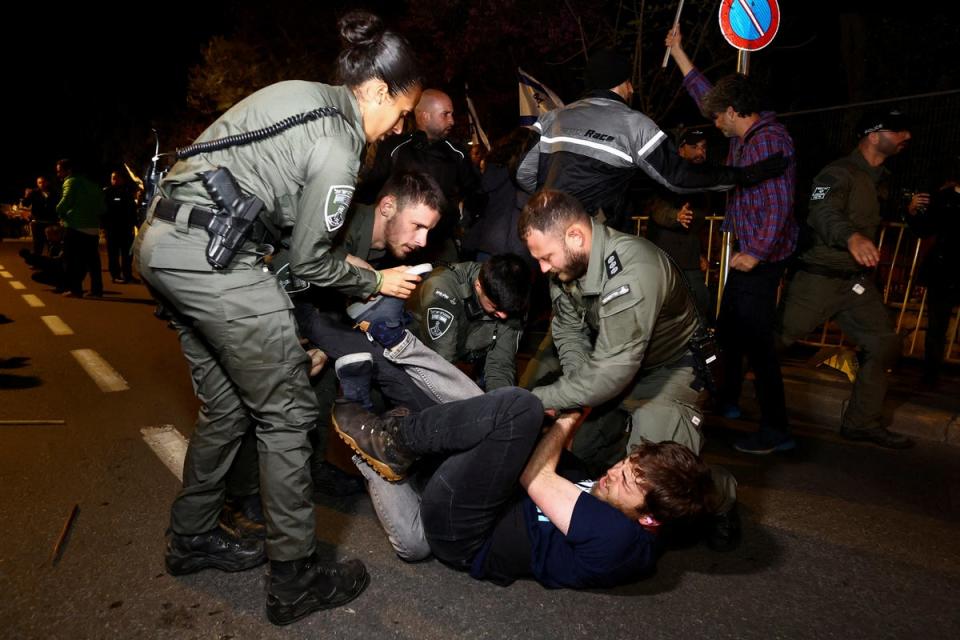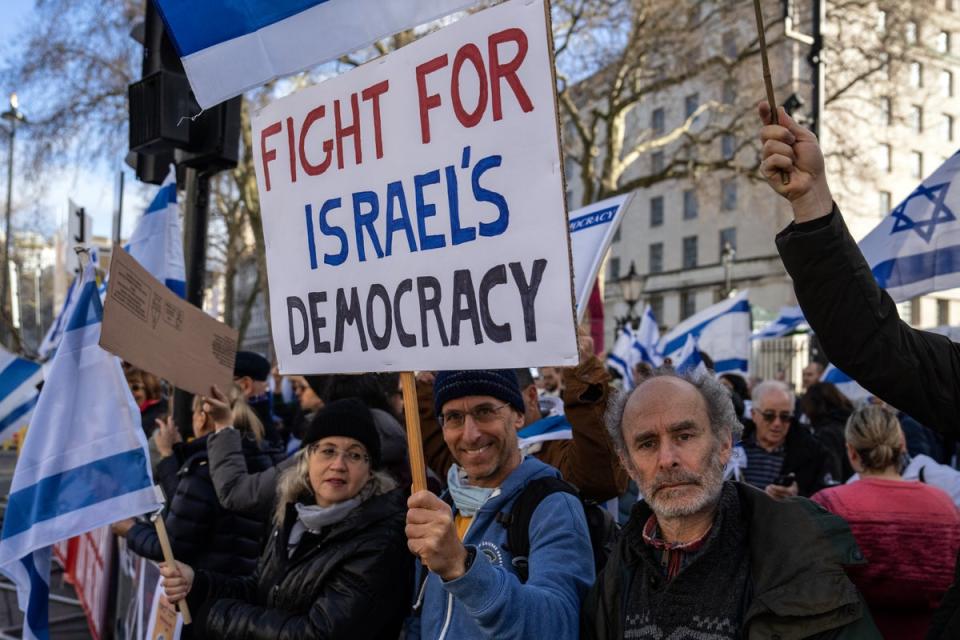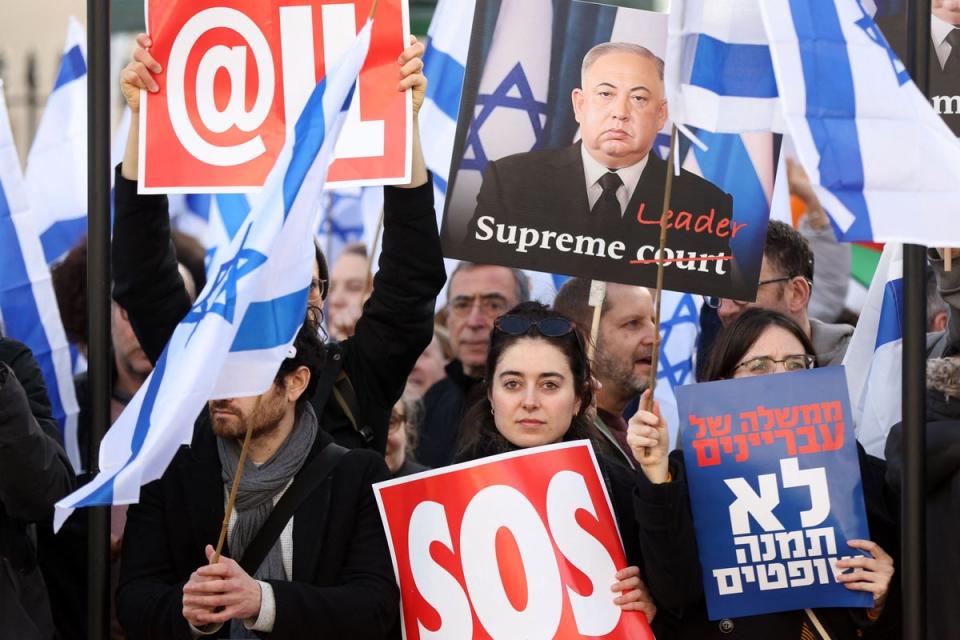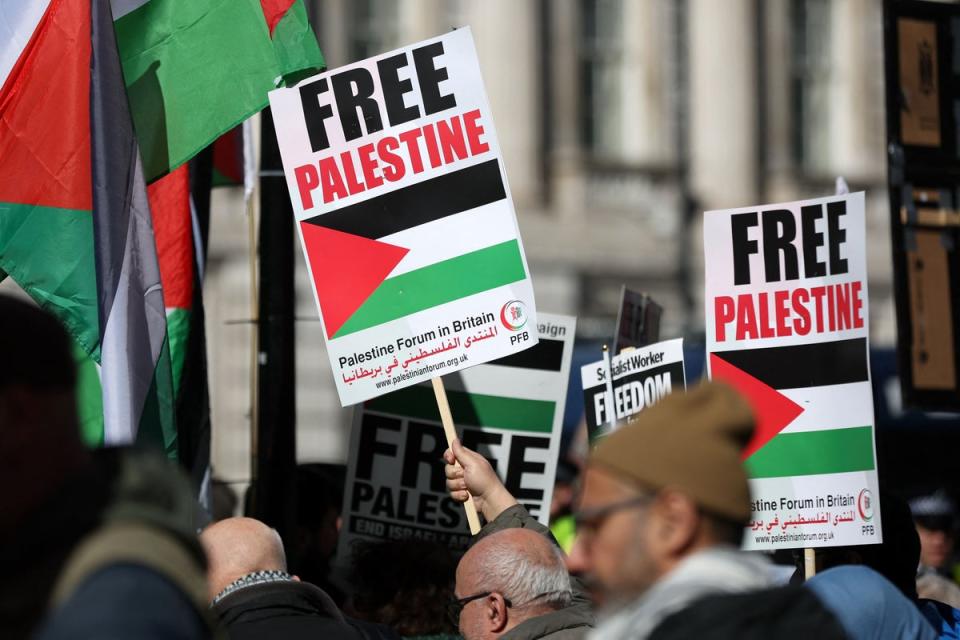Flights grounded at major airport in Israel amid mass protests over Benjamin Netanyahu’s judicial reforms

Flights out of Israel’s main international airport have been grounded amid surging protests over Prime Minister Benjamin Netanyahu's plan to overhaul the judiciary.
Departing flights out of Ben Gurion Airport were grounded in protest, affecting thousands of travellers on Monday.
It comes as the country’s largest trade union group, which represents more than 700,000 workers in health, transit and banking, among many other fields, has launched strike action that could slow parts of Israel’s economy.
Other sectors are following suit, with local governments, which manage pre-schools and other essential services, as well as a main doctors union announcing they would walk out.
It’s unclear if the strikes would cause Mr Netanyahu to halt the overhaul. He was expected to make an announcement on Monday morning but has reportedly suspended it amid the chaos.
Israel’s Ken broadcaster is reporting that he told coalition heads he will pause the overhaul, which includes a law that would give the governing coalition the final say over all judicial appointments.
His coalition government survived a no-confidence motion filed by the opposition in protest at its judicial overhaul plan on Monday morning.
Just hours earlier Israel’s president urged Mr Netanyahu to come to his senses and immediately stop a contentious overhaul of the judiciary.
Isaac Herzog’s plea follows a night of raucous protests where tens of thousands of demonstrators lit bonfires on Tel Aviv’s main highway after Mr Netanyahu’s sacking of the defence minister.
Three months after it took power as one of the most right-wing governments in the country’s history, Yoav Gallant’s removal has plunged Mr Netanyahu’s national-religious coalition into crisis, during a deepening security emergency in the occupied West Bank. Protests have been raging for weeks.
Israel protests over Benjamin Netanyahu’s judicial overhaul plan | March 2023











Mr Herzog called on the government to put aside political considerations for the sake of the nation.
“Deep concern surrounds the entire nation,” he wrote on Twitter.
“Security, the economy, society - all are threatened. The eyes of all the people of Israel are on you.
“The eyes of the entire Jewish people are on you. The eyes of the whole world are on you.
“I appeal to the heads of all Knesset factions, coalition and opposition alike, to put the citizens of the country above all else, and to act responsibly and courageously without further delay.
“Come to your senses now! This is not a political moment, this is a moment for leadership and responsibility.”
The warning from the head of state, who is supposed to stand above politics and whose function is largely ceremonial, underlined the alarm the divisions opened up by the proposals has caused.
The judicial overhaul has sparked one of Israel’s gravest domestic crises, drawing widespread opposition from business leaders, legal officials and even the country’s military.

An uneasy calm returned to the country’s streets after a night of protests blocked Te Aviv’s major throughway as well as others throughout the country.
Mr Netanyahu’s dismissal of Mr Gallant appeared to signal that the prime minister and his allies will forge ahead this week with the overhaul plan.
Mr Gallant had been the first senior member of the ruling Likud party to speak out against it, saying the deep divisions were threatening to weaken the military.
The government still appeared to be pushing ahead for a parliamentary vote this week on a centerpiece of the overhaul — a law that would give the governing coalition the final say over all judicial appointments.
It also seeks to pass laws that would would grant parliament the authority to overturn Supreme Court decisions and limit judicial review of laws.
Mr Netanyahu and his allies say the plan will restore a balance between the judicial and executive branches and rein in what they see as an interventionist court with liberal sympathies.
But critics say the laws will remove Israel’s system of checks and balances and concentrate power in the hands of the governing coalition.
Mr Netanyahu, on trial on corruption charges that he denies, has so far vowed to continue with the project and a central part of the overhaul package, a bill that would tighten political control over judicial appointments, is due to be ratified in parliament this week.
As well as drawing opposition from the business establishment, the project has caused alarm among Israel’s allies.
The United States said it was deeply concerned by Sunday’s events and saw an urgent need for compromise, while repeating calls to safeguard democratic values.
Mr Netanyahu’s visit to Downing Street in London on Friday was overshadowed by protests in the capital.
Demonstrators protest on Whitehall ahead of a visit by Israel’s Prime Minister Benjamin Netanyahu











Prime Minister Rishi Sunak met with Mr Netanyahu for talks, including on Vladimir Putin’s war in Ukraine and Iran’s nuclear ambitions.
As he arrived at No 10, Mr Netanyahu was greeted by shouts of “shame” from pro-democracy protesters demonstrating against the judicial overhaul.
After the talks, the Prime Minister’s spokesman said: “The Prime Minister stressed the importance of upholding the democratic values that underpin our relationship, including in the proposed judicial reforms in Israel.”

 Yahoo Movies
Yahoo Movies 